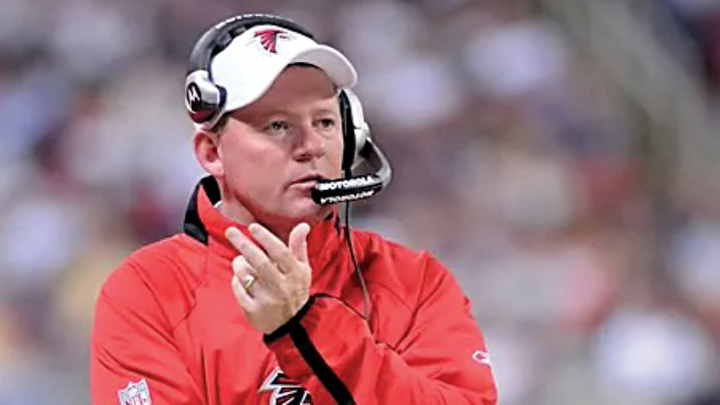Headsets Potentially Give Hogs Advantage if Team Can Literally Make Them Work

It should have happened quite a while ago, but the high profile cheating scandal involving Jim Harbaugh and Michigan hiding people in stands and on sidelines to film opponents to steal signs before facing them became the tipping point in college football.
This fall, college coaches will be able to talk with someone on offense and on defense via headset to make calls rather than the goofy system of holding up colors and signs featuring everyone from Charles Barkley to The Joker. Theoretically, it will eliminate some of the problems that came with using signals, even against schools that weren’t willing to break rules to steal signs.
“In 2021 when I was at Baylor, there's a team that we played early in the season, (Oklahoma State) and they had somebody on their staff that had just worked for us that previous spring ball,” Arkansas offensive line coach Eric Mateos said on the "Coaches and the Mouth" podcast. “And it was really interesting how nice their game plan was during that game (a 24-14 loss). We got an opportunity to play them again in the Big 12 championship game and it was a different story. We changed our signals and changed our communication tactics, and we won the Big 12 championship (21-16). And so I think just some of that BS that goes on, you know, I think it'll help eliminate a lot of that stuff.”
However, Arkansas’ first live in-game test didn’t go all that great. Razorbacks offensive coordinator Bobby Petrino struggled with connection issues that brought out a little of the old Petrino as he attempted to fight his way through the Red-White spring game.
“We had some technical difficulties and coach was not pleased with the quality that we were experiencing,” Mateos said. “That was one of those put my mic up moments. I'm just gonna put my mic up and not being involved in this.”
The Arkansas staff is anxious to get a chance to see how other teams decide to ultimately utilize the headsets to help them not only adjust, but also learn from what works well and what doesn’t. Logic would say the coaches can spend part of the summer watching NFL teams, but the difference in how coordinators run things at the college level means that might not be the best use of time.
“In the NFL, they don't want signals anyways,” Mateos said. “I'm interested to see how that speeds up the tempo teams. I'm interested to see that because nobody in the NFL is really going at that tempo high, high velocity, high rep count pace. I'm interested to see how that comes into effect now with the helmet communication.”
One thing they anticipate seeing is a return to a few old school methods.
“I'm interested to see if more teams go back to the huddle, maybe a little bit more huddling,” Mateos said. “I know we're gonna do both, but I'm interested to see how that changes that."
One thing he’s excited to see is how Petrino uses the ability to huddle to continuously keep opposing defenses off balance. Mateos anticipates it will complicate things for defensive coordinators.
“I think the beauty of huddling, and I'm not saying always huddle, I think the best thing about football is changing tempos,” Mateos said. “Hey, can you go fast and go slow? But I think the cool thing about huddling is the way defensive coordinators are calling the game now. Everybody's waiting to see the formation, so defensive coordinators are calling the game, they're waiting. You can see it. You watch a game and all the defensive players are looking at the sideline, just waiting, waiting, waiting. That defensive coordinator's waiting for the formation before he makes the call.
It should be an advantage Arkansas hasn’t had in a while. If handled correctly, the potential is there to increase how explosive the Hogs can be on a per play basis.
“We have a kind of offense where we can huddle,” Mateos said. “So then you can't see, 'Wait, what is what what is that? I can't tell,' and then shift and motion and change it and it's like, 'Well, we're not going to wait to see the formation anymore. You know, we're just going to call the defense,' which I think gives the offense the advantage again.”
The Razorbacks have about 2.5 months left to sort out the technical issues regarding the headsets. That’s also a long time for Petrino, who has experience utilizing headsets in the game plan from his days in the NFL, to figure out how best to gain an advantage.
Arkansas will find out for real the pros and cons of utilizing headsets to communicate when it opens the season on Thursday night, Aug. 29 against Arkansas-Pine Bluff in War Memorial Stadium before heading to Stillwater, Oklahoma to face Oklahoma State to open the September slate.
HOGS FEED:
• Hogs find offense despite best hitter struggling this past weekend
• White sparks Arkansas' bats to life
• Arkansas storms back to snatch series from Mississippi State
• Subscribe and follow us on YouTube
• Follow allHOGS on X and Facebook
